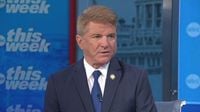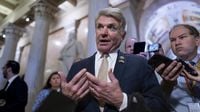Representative Michael McCaul, a Republican from Texas and one of the most influential voices in Congress on foreign policy and national security, announced on Sunday, September 14, 2025, that he will not seek reelection in 2026. The announcement, made during an interview on ABC’s “This Week,” marks the end of an 11-term career that has spanned more than two decades and left a significant imprint on U.S. policy at home and abroad.
McCaul, 63, has long been recognized as a hawk on issues of national security. Over the years, he has chaired both the House Foreign Affairs Committee and the Homeland Security Committee, and more recently, he served as the chair of the House China Task Force. His district, which stretches from parts of Austin to the Houston suburbs, has reliably supported Republican candidates, and McCaul himself handily won reelection in 2024 with more than 60% of the vote, according to The Texas Tribune and ABC News.
“It’s been an honor to serve over two decades in the Congress,” McCaul said during his televised interview. “I’m looking now for a new challenge.” He added, “I want to continue serving the people of this country in national security and foreign policy and do what I’ve done for the last two decades to make America stronger and the world safer.”
McCaul’s decision comes at a time of heightened global tensions, particularly with Russia’s ongoing invasion of Ukraine. Just last week, Russian drones reportedly intruded into Polish airspace, prompting NATO to scramble jets in response. While Russia dismissed the incident as an error, Poland and other European countries insisted it was a deliberate provocation. President Donald Trump suggested the incursion "could have been a mistake," but McCaul was quick to challenge that assessment. “With all deference to the president, I don't think that was a mistake. I think Putin is testing the resolve of NATO,” McCaul told ABC News.
He continued, “We’ve never seen anything like this in recent times. What I’m concerned about is that the escalation here and the temperature rising, we got to be very careful not to be on the precipice of a World War III.” McCaul’s words echoed the anxieties felt in many Western capitals as Russia’s actions become increasingly aggressive, not just with drone incursions but also with war game exercises along NATO borders, flights of nuclear bombers near Polish airspace, and military maneuvers in the Arctic.
McCaul has not shied away from criticizing world leaders, including Russian President Vladimir Putin and even President Trump. On the subject of Trump’s negotiations with Putin, including a recent invitation for talks in Alaska, McCaul was blunt: “I never had any good faith anticipation of these negotiations. Putin is a KGB once and always. And I don't think he's playing fair. I think he's manipulating the president, as a KGB officer would. I think the president, though the good news is, is waking up to the fact that Putin is not negotiating in good faith, not making concessions, and has to be dealt with.”
His outspokenness hasn’t been limited to Russia. McCaul has also been a strong supporter of U.S. aid to Ukraine since Russia’s 2022 invasion, and he’s been an antagonist toward China. In 2023, after visiting Taiwan, McCaul was personally sanctioned by the Chinese Communist Party for what it called interference in China’s “internal affairs.” He responded defiantly: “Being sanctioned by the Chinese Communist Party is a badge of honor. Nothing will deter the United States from supporting free, democratic nations — including Taiwan.”
McCaul’s influence in Congress has extended beyond foreign policy. He was an early advocate for cybersecurity and has consistently supported strong security measures at the U.S.-Mexico border. His legislative work has often reflected his background as a former federal counterterrorism prosecutor, a career choice he says was inspired by his father’s service in World War II and the impact of the September 11, 2001, terrorist attacks. “My father’s service in World War II inspired me to pursue a life of public service, with a focus on defending our great nation against global threats, and I have been proud to carry out that mission in Congress for more than two decades,” McCaul said in a news release, as reported by The Texas Tribune.
McCaul’s retirement is part of a broader trend among senior Texas Republicans, who are seeing their influence in the House wane as more experienced members step down. He is the third Republican this year to announce plans to retire without seeking another office, joining Don Bacon of Nebraska and Morgan Luttrell of Texas. According to The Texas Tribune, only four Texas Republicans in Congress predate Trump’s first term, and McCaul is among them.
His departure also comes amid significant changes to Texas’s political landscape. In a rare mid-decade redistricting effort in August 2025, Republican leaders redrew congressional maps to shore up GOP control in several districts, including McCaul’s. While the new lines concentrate more of his district in the increasingly Democratic city of Austin, Republican dominance remains likely. Under the new map, Donald Trump would have carried the district with 60.5% of the vote in 2024, compared to 61.6% under the old boundaries.
McCaul’s exit leaves a vacuum in Central Texas politics. With his retirement, as well as Chip Roy’s decision to run for Texas attorney general, multiple congressional seats in the region are now open, sparking intense interest among local Republicans. The redistricting has also altered neighboring districts, making some more competitive and others more solidly Republican.
McCaul’s legacy will likely be defined by his unwavering focus on national security and his willingness to challenge both allies and adversaries. He has repeatedly cautioned against complacency in the face of global threats and urged the U.S. to maintain strong alliances. As he prepares to leave Congress, McCaul says he remains committed to serving the country in a new capacity. “I am ready for a new challenge in 2027 and look forward to continuing to serve my country in the national security and foreign policy realm,” he told The Texas Tribune.
While the halls of Congress will soon lose one of their most experienced foreign policy hands, McCaul’s influence on America’s approach to global security is unlikely to fade anytime soon.






